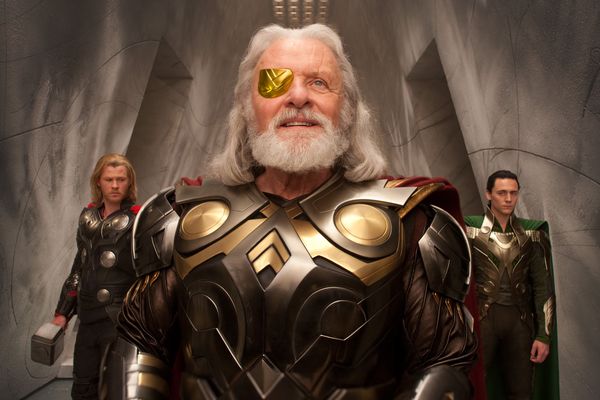New Pop Theology contributor Tony Mills reviews Thor, the latest Marvel single-character blockbuster leading up to next year’s hero-studded team up movie, The Avengers. Check it out after the jump…if you don’t mind spoilers.
Thor begins with astrophysicist Jane Foster (Natalie Portman) and her research associates Erik (Stellan Skarsgård) and Darcy (Kat Dennings) looking for strange astronomical signs somewhere in the New Mexico desert. They find the mother lode when warrior god Thor (Chris Hemsworth) crash lands on Earth. Immediately the film turns to Thor’s back story in his home realm of Asgard where he is set to take over the throne from his father Odin (Anthony Hopkins), who has kept their home safe, partially through a treaty with a race of warmongering Frost Giants. The Asgardians had also protected humans from destruction at the hands of these Frost Giants (hence Nordic worship of them years later). When some of these giants break in (or are let in?) to Asgard on the day of Thor’s ascension, Thor responds by taking his friends and his brother Loki (Tom Hiddleston) to the Frost Giant home of Jotunheim to teach them a lesson, entirely against his father’s commands.

I don’t want to assume that director Kenneth Branagh and the writers had today’s political context in mind when highlighting the disagreement between Odin and Thor over how to respond to the potential terrorist attack of the Frost Giants (they were destroyed by a robotic guardian before they could do any harm in Asgard), but it’s difficult not to draw parallels. When he learns about the perpetrators, Thor is bent on invasion, but Odin insists that this was not an act of war, only the actions of a few rogue individuals. The wise king, Odin calmly tells Thor, knows better. Of course, a possible implication here is that Bush and Obama are not wise rulers because they mistake the actions of a few for the work of an entire nation (Afghanistan and Iraq) and proceed to war. When Thor reacts in similar fashion and invades Jotunheim with his friends, he nearly leads them to their deaths until Odin rescues them. Odin chastises Thor for his actions, strips him of his power for opening Asgard to unnecessary war, and calls him “a vain, greedy, cruel boy,” criticisms that might well apply to any number of Western leaders. Odin then banishes Thor and his hammer, Mjolnir, to Earth.
At this point, Jane and company find him, along with the secret military group S.H.I.E.L.D., who we have seen hints of in previous Marvel movies, at work assembling the Avengers. When Thor receives word from his mischievous and deceptive brother Loki that Odin is dead and that he is eternally forbidden from Asgard, he is struck with remorse over his actions and slowly resigns himself to life on Earth, which is of course made more palatable by his growing fondness for Jane. The film doesn’t take much time to register Thor’s change of heart from callous, hotheaded young man to humble and responsible adult, but it does the best with the time allotted, aided chiefly by Hemsworth’s performance. By the time his friends from Asgard come for him, followed by the giant fire-breathing metal guardian that Loki sends after them, Thor is now ready to make the ultimate sacrifice. Seeing the devastation and imminent doom of his loved ones, Thor pleads to Loki, apologizes for whatever offense he did to him, and offers his life in order to spare his friends. Loki accepts, but as Thor lies dying (or dead), he is now considered worthy of Mjolnir and its power, which leads to a potentially spiritual transfiguration sequence (shades of the events in Disney’s Hercules film).
Thor‘s ending, however, is confusing. Loki invites the leader of the Frost Giants, Laufey (Colm Feore), to kill the comatose Odin, only to double-cross him and kill Laufey instead. Loki is also, quite unexpectedly, bent on completely destroying Jotunheim for no apparent reason. Thor stops him from doing so, and although his new-found honor prohibits the killing of an entire race, any visible emotional attachment to this decision is absent. In order to prevent this destruction, Thor must even destroy the Rainbow Bridge that leads out of Asgard, which will also prevent him from reuniting with Jane. Again, a noble sacrifice, but the film does not allow us to empathize with Thor or with the Frost Giants, who are simply presented as ruthless others. On the other hand, the point might be to see the wisdom and compassion of a now humbler Thor despite the ostensible unworthiness of those he wants to save. In terms of film narrative and drama, however, it doesn’t quite work. All this leads me to my main critique of the film, which is a rare one in films of this nature. Thor is simply too short and could have easily benefited from an extra thirty minutes to develop some of the plot lines that it introduces. Nevertheless, even as an engaging popcorn flick, Thor is not a typical Hollywood glorification of violence. It benefits from solid acting and special effects and offers fresh (at least for this genre) perspectives on war and leadership that we so desperately need today.










